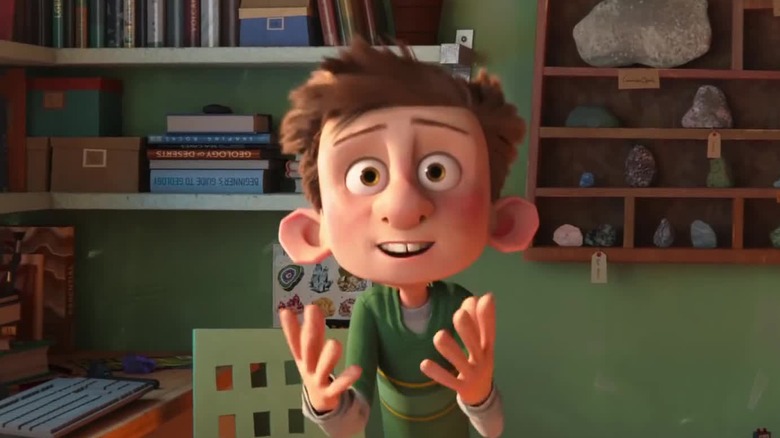"Ron's Gone Wrong," the newest feature-length animated movie from Walt Disney Studios and Locksmith Animation, stars Jack Dylan Grazer as awkward middle-schooler Barney Pudowski. Tech company Bubble has invented bubble-shaped robots called B-bots, each one a "best friend out of the box" that learns each child through their myriad social media profiles – a sort of combination between a robot dog, smartphone, and personal assistant. Barney's B-bot Ron (Zach Galifianakis), however, is damaged: it can't connect to the Bubble cloud and is thus a tabula rasa, learning friendship the old fashioned way. Hijinks ensue.
I spoke with Sarah Smith (co-writer, director, executive producer) and Peter Baynham (co-writer) about the film, its themes, Ron's similarities to humanity's real-life canine best friends, and more.
"You Can't Throw The iPhone Away. You Can't."
I really enjoyed "Ron's Gone Wrong." Can you tell me about its origins?
Sarah Smith: It was an idea that I had … actually I was watching the screener for the Spike Jonze film "Her," and I thought, we have to make that movie for kids, because I was having all the parental angst you have when your child first starts picking up an iPad and getting lost in there, and you realize that you don't really know where they're going or what's happening or who they're talking to. And they have no filters for realizing that maybe not everything in that world is maybe what they think it is.
My kid was going to school at that time, and you start to remember all of the nightmare of the playground politics, and then you relive them because you see all the other moms who are going off to coffee and you go, "Are they going to invite me? Am I going to be part of the 'in mom's group?'" You relive all of that as well. And Pete and I have children the same age, and I just felt like there was something super important [with] the experience, the perennial emotion of trying to figure out your friendship world and this new complexity of social media and technology.
Peter Baynham: Yeah, it's their navigation of that world but it's also our navigation of that world. [It was] very important to us to not be a movie that was lecturing, 'Oh, in my day you just have a stick and a ball and some leaves, and you do this and you go off to the woods.' And that's why [we] had the dad say that stuff in the movie whilst on his phone … to send up that whole thing, because I think every parent has had that moment of hypocrisy where you can just go off and then you're actually on your own device. I remember when my daughter was a baby and [ … ] being in a restaurant and seeing another family [ … ] it was some parents with a kid watching a CD-ROM, the kid was five. I remember thinking, "Oh, we're not going to be those people." And of course, cut to five years later and there were the iPads.
Sarah Smith: We had a very good executive mate early on from Emma Watts, who's now at Paramount, and she said, "[Kids] mustn't smell medicine. If they smell medicine, they won't like it." You can't preach to kids. And originally in my head, I thought the end of the movie would be all the thoughts went away, and I pictured this cinematic moment where the kids would look up and look at each other in the face for the first time, and some of that will be healed. And then so quite early on, someone went, "That's not going to happen is it? You're going to have to learn to live with it." [ … ]
Peter Baynham: [ … ] You can't throw the iPhone away. You can't.
"It's About A Relationship That's The Opposite Of A Curated One"
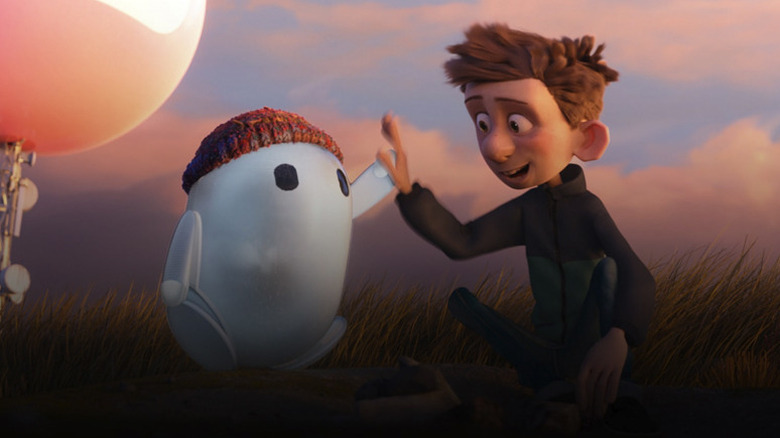
To build off some of those themes, the film seems to really contrast this contemporary, big data, digital approach to friendship [against the] actually-spending-time-getting-to-know-someone, traditional approach to friendship. Could you talk about that theme specifically?
Sarah Smith: It's the theme of curation, isn't it? That you can put a version of yourself out there and that's all people know of you. And the difference in a real relationship, like families and real friendships, is when you know the stuff that the other person maybe would otherwise hide or doesn't particularly want you to know. Barney's scared of the dark and he doesn't ever tell anyone that, but Ron figures it out. And it's all about a relationship that's the opposite of a curated one, the way you're allowed to see inside your real self, because there's so much pressure to curate our image online, isn't there? And to edit your pictures and have enough followers. And it's a scary world when your popularity is so publicly out there for kids.
Peter Baynham: We tried to do that with the popular Savannah, the popular queen bee girl of the school, because we wanted it to be not just Barney [who] has this moment of growth and realizes that he can be confident, but all those kids. Because we just believe in art, so we're not the only people go into a party standing in the corner going, "I don't know who to talk to there." We think lots of people feel that way. And I read something a while ago that sales of certain makeups have exploded –
Sarah Smith: – and plastic surgery.
Peter Baynham: – because people are trying to look as good as their Instagram filters. So people are trying to compete with digital fakery and you think, "Oh my God." And that's what's great about obviously with Ron, because Ron isn't interested in that at all, and so that felt really important.
"It's The Difference Between An iPad And A Puppy"
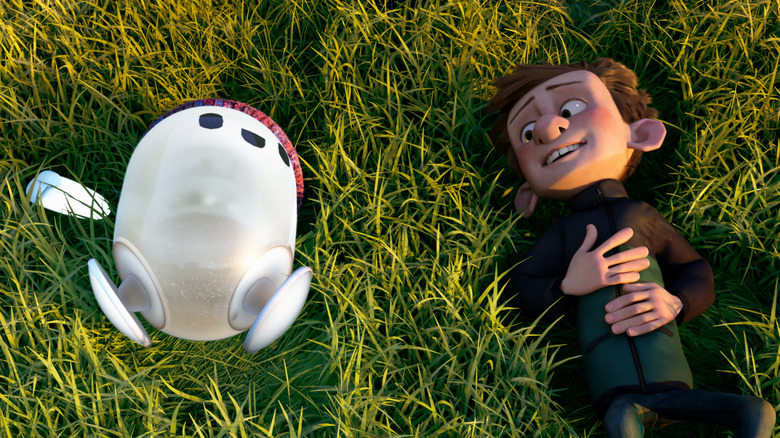
To talk about Ron's character a bit, oddly enough he reminded me of my dog: small and dorky but very loyal, happy, enthusiastic, and he knows literally nothing.
Sarah Smith: That's exactly right! In fact, early on [ … ] I remember talking, I think to animators or maybe to JP [fellow director Jean-Phillipe Vine], I can't remember, but I said, 'The difference between Ron and the other B-Bots is the difference between the iPad and a puppy.' For children, by the way, puppies are annoying and they get in their face, [but] the iPad does exactly what you want when you want. You can turn it off when you want, you can turn it on, it gives you [only] what you want, they love it. Puppies are annoying and they eat your shoes and poo on the floor, but in the end the relationship with a puppy is a wonderful thing. And that was really the difference, and I think we talked about that in the animation stage of development as well.
That's fascinating.
Peter Baynham: It's like my daughter said about our dog the other day, she said, 'Oh, she's only got one word and that's hello.' They don't even have the word goodbye. So when you're walking up to your house, the dog's looking, 'Hello, hello.' As you're going out of the house, if you're leaving the dog at home, they're still looking at you going, 'Hello?' Very simple. That was really important with Ron, that he wasn't going to be ever … we weren't going to impose some fake AI kind of consciousness on him. And I think by the end we theorized that [ … ] Ron has a gradual [development] like a baby, just learns individual bits of information and remembers bits of things … he built vocabulary, but it's just sentences that he's added to his database.
Sarah Smith: We were really rigorous going through each scene. As we got to a new scene, we would go back and say 'What has he heard and what has he seen? And now that's what he can use in this scene…', and then you keep adding to it. In animation, we did the same thing. We were like, "Okay, he can start off really rickety, but by the end of this scene he's learned to be a little bit less wobbly. And then in this scene he can…" [That process] is super complicated when everything's being done out of order, but it was kind of important to see that kind of development as he learned across the movie and became more competent.
I'm so glad to hear that was part of your discussions, because I totally got that.
Ron And Borat Are "Actually Not Dissimilar"
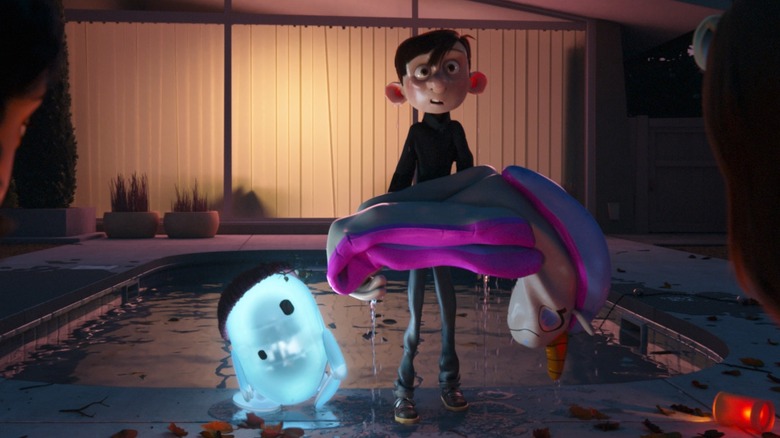
Peter, I have a question for you because you have a background obviously in both live-action and in animation, your last film being the "Borat" sequel. They're both really funny movies but the humor is different. How would you compare how you approached the two projects?
Peter Baynham: I think Disney especially might have a problem with "Borat" type humor making it's way in here [ … ] actually, we talked a lot about the fact that they're actually not dissimilar, in that both Ron specifically and Borat are both clown characters. And Sacha Baron Cohen's background is in clowning, he studied clowning in Paris. And so as a whole theory of clowning about how the character must be very simple and must be very 'Yes!,' and doesn't really ever have the word 'no.' And also, just like a kid will keep going, 'Why? Why can't I do that? Why can't I walk under a truck? I don't understand.' And Ron is very much the same, and yeah, it's very much, I always joke that [after] having done a Borat movie or one of those [kinds of] movies, I like to come in and put something nice and wholesome into the world.
Sarah Smith: I think Pete and I both met working on edgy, adult comedy, and that was the sort of work we did together. But when we come into animation, we come as parents and as old friends, and we also – I think part of the reason we both gravitated towards animation from edgy adult comedy was that we're massively emotional softies and we love, love big stories. And so we're addicted to the big story and we're addicted to emotional stories, and then you get to also do your comedy, but you get to do the other as well in animation.
Peter Baynham: I actually drive people nuts in the more adult end of it, where I'm going on about "Toy Story." [People are like] 'Why are you talking about "Toy Story" in a bar at a writing meeting?' And I go 'Because it's just a brilliant story, and they're great storytelling and that belongs anywhere.'
"I Don't Think I've Ever Been Asked To Give Less Emotion"
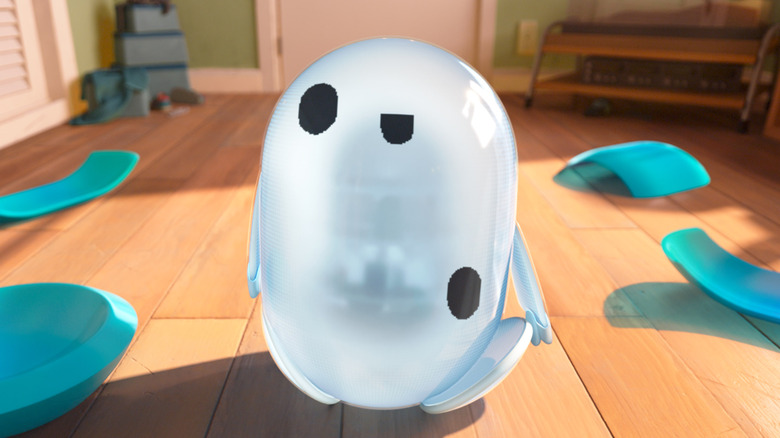
What it was like working with Zach Galifianakis in the role of Ron?
Sarah Smith: Zach is so delightful. Really, it's such a thing – you get to cast some of your comedy heroes and it's incredibly daunting when you start working with them and then Zach is actually one of the nicest people in the world. In fact, they all were, they're a delightful and kind cast. Zach is so humble, he said, 'I'm not really an actor. Just tell me how you want me to do it,' and he said, 'I don't think I've ever been asked to give less emotion,' which is what we would say. I would go 'That's too emotional, just make one sort of straight' and he's prepared to try over and over again, he'll give you a million different takes. He throws in his own comedy and tone of voice, he was great at improvising when we managed to get him together with Jack. One of our favorite scenes has a piece of their improvisation in it. So he's an absolute joy, he's a delightful person to work with. He just has such a sort of naughty charm about him and a sort of innocence, a fake innocence and a naughty charm, which is completely Ron-ish.
Peter Baynham: Yeah, he really got that, didn't he? Because Ron, in a way, it's almost like he's [just] gradually building sets of recordings that are just arranged in different ways [ …] We became obsessed at one point with… oh my God, Ron's like the old Microsoft paperclip guy that used to say, 'It looks like you're trying to write the letter. Can I help?' No, you can't.
Sarah Smith: Actually Pete, [it's interesting when] you say that about the set of recordings, because … when he says, 'Please connect me to the bubble network,' I chose one of those early on. And every way he says it in the movie, we just use that one again. And often with the editor we cut up bits of takes of him, so that it feels properly botty and not too human.
Peter Baynham: It's meant to be like [when] you ring somewhere and you get put on hold, and then a bot comes on and it's a pre-recording of somebody going, 'I'll put you right through. I can't seem to get through to that person right now. Can I put you on hold?' And there's even a little chuckle quite often. And that just felt like an exciting way to create a character.
"We've Been Working On Zoom So Long That It Is Inexcusable That We Didn't Get Shares In It"
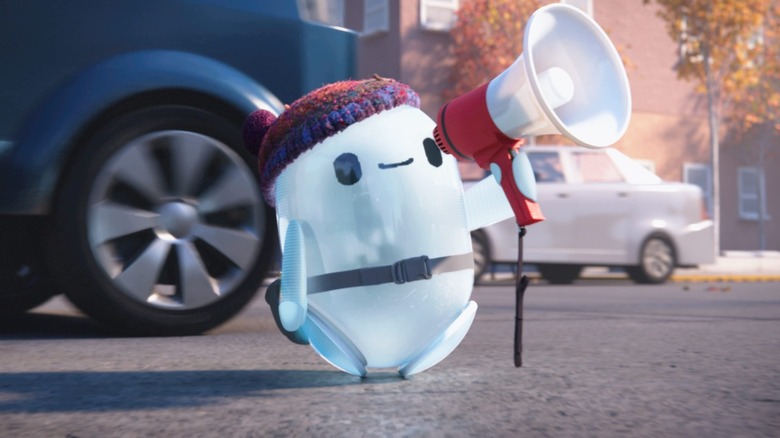
What was it like for you making a movie about the hardship of being isolated and the importance of connection, but making most of it while isolated and working separately?
Sarah Smith: Well, we lived it, didn't we? We all lived the world in which all we had was screens, and missing that kind of joyful, human, out-there-in-the-world relationship became a real thing that we all felt. It was an enormously difficult and complex time and carried through by a lot of friendships that formed among our crew before it started. And Pete and I, we don't actually mind that at all because we'd been working remotely for years, because Pete's in LA and I'm here. And even when he comes over and we're writing something, he sits in another room and we just shout through the wall, we literally do. We have separate rooms, we send the material backwards and forwards … sometimes we riff it, but mostly we send it backwards and forwards. So, for us, actually I don't mind the Zoom world at all, but I think it needs you to have known someone for 30 years for it not to matter. With everybody else, I miss their physical presence.
Peter Baynham: I mean, we've been working on Zoom so long that it is inexcusable that we didn't get shares in it.
I feel like we all missed a big investment opportunity.
Peter Baynham: I know [we did] … The other thing is that it's almost like we were already Graham, the dad, in the shirt and the tie but then [also] the pajamas working at home trying to unplug stuff, plug stuff in, nothing's working. And he thinks 'I'm working at home. I get to be around my kid.' [But] of course, you're actually completely absent, and you're just constantly shutting the dog or the kids out of your room. [It's] like that guy who was on the news a couple of years ago, the guy whose kid [just] came in, that brilliant thing. And then the pandemic happened and then everybody was that parent, because that just happened to everyone … so I'd like to claim we were prescient.
"Ron's Gone Wrong" is in theaters now.
Read this next: The 14 Best Animated Movies (That Aren't Made By Disney Or Pixar)
The post Ron's Gone Wrong Creators Sarah Smith and Peter Baynham on Ron's Similarities to Puppies (and Borat) appeared first on /Film.

